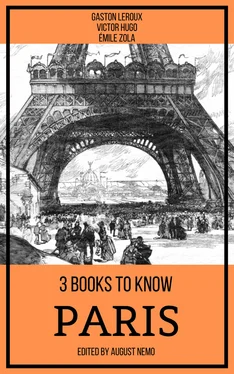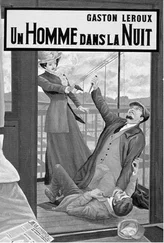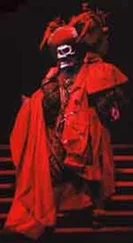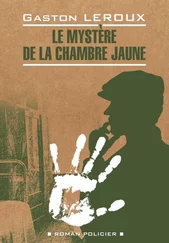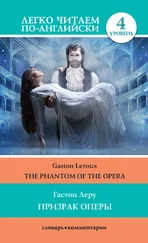The whole chamber, moreover, presented a general aspect of abandonment and dilapidation; and the bad state of the utensils induced the supposition that their owner had long been distracted from his labors by other preoccupations. Meanwhile, this master, bent over a vast manuscript, ornamented with fantastical illustrations, appeared to be tormented by an idea which incessantly mingled with his meditations. That at least was Jehan’s idea, when he heard him exclaim, with the thoughtful breaks of a dreamer thinking aloud,—
“Yes, Manou said it, and Zoroaster taught it! the sun is born from fire, the moon from the sun; fire is the soul of the universe; its elementary atoms pour forth and flow incessantly upon the world through infinite channels! At the point where these currents intersect each other in the heavens, they produce light; at their points of intersection on earth, they produce gold. Light, gold; the same thing! From fire to the concrete state. The difference between the visible and the palpable, between the fluid and the solid in the same substance, between water and ice, nothing more. These are no dreams; it is the general law of nature. But what is one to do in order to extract from science the secret of this general law? What! this light which inundates my hand is gold! These same atoms dilated in accordance with a certain law need only be condensed in accordance with another law. How is it to be done? Some have fancied by burying a ray of sunlight, Averroës,—yes, ‘tis Averroës,—Averroës buried one under the first pillar on the left of the sanctuary of the Koran, in the great Mahometan mosque of Cordova; but the vault cannot be opened for the purpose of ascertaining whether the operation has succeeded, until after the lapse of eight thousand years.
“The devil!” said Jehan, to himself, “‘tis a long while to wait for a crown!”
“Others have thought,” continued the dreamy archdeacon, “that it would be better worth while to operate upon a ray of Sirius. But ‘tis exceeding hard to obtain this ray pure, because of the simultaneous presence of other stars whose rays mingle with it. Flamel esteemed it more simple to operate upon terrestrial fire. Flamel! there’s predestination in the name! Flamma! yes, fire. All lies there. The diamond is contained in the carbon, gold is in the fire. But how to extract it? Magistri affirms that there are certain feminine names, which possess a charm so sweet and mysterious, that it suffices to pronounce them during the operation. Let us read what Manon says on the matter: ‘Where women are honored, the divinities are rejoiced; where they are despised, it is useless to pray to God. The mouth of a woman is constantly pure; it is a running water, it is a ray of sunlight. The name of a woman should be agreeable, sweet, fanciful; it should end in long vowels, and resemble words of benediction.’ Yes, the sage is right; in truth, Maria, Sophia, la Esmeral—Damnation! always that thought!”
And he closed the book violently.
He passed his hand over his brow, as though to brush away the idea which assailed him; then he took from the table a nail and a small hammer, whose handle was curiously painted with cabalistic letters.
“For some time,” he said with a bitter smile, “I have failed in all my experiments! one fixed idea possesses me, and sears my brain like fire. I have not even been able to discover the secret of Cassiodorus, whose lamp burned without wick and without oil. A simple matter, nevertheless—”
“The deuce!” muttered Jehan in his beard.
“Hence,” continued the priest, “one wretched thought is sufficient to render a man weak and beside himself! Oh! how Claude Pernelle would laugh at me. She who could not turn Nicholas Flamel aside, for one moment, from his pursuit of the great work! What! I hold in my hand the magic hammer of Zéchiélé! at every blow dealt by the formidable rabbi, from the depths of his cell, upon this nail, that one of his enemies whom he had condemned, were he a thousand leagues away, was buried a cubit deep in the earth which swallowed him. The King of France himself, in consequence of once having inconsiderately knocked at the door of the thermaturgist, sank to the knees through the pavement of his own Paris. This took place three centuries ago. Well! I possess the hammer and the nail, and in my hands they are utensils no more formidable than a club in the hands of a maker of edge tools. And yet all that is required is to find the magic word which Zéchiélé pronounced when he struck his nail.”
“What nonsense!” thought Jehan.
“Let us see, let us try!” resumed the archdeacon briskly. “Were I to succeed, I should behold the blue spark flash from the head of the nail. Emen-Hétan! Emen-Hétan! That’s not it. Sigéani! Sigéani! May this nail open the tomb to any one who bears the name of Phoebus! A curse upon it! Always and eternally the same idea!”
And he flung away the hammer in a rage. Then he sank down so deeply on the arm-chair and the table, that Jehan lost him from view behind the great pile of manuscripts. For the space of several minutes, all that he saw was his fist convulsively clenched on a book. Suddenly, Dom Claude sprang up, seized a compass and engraved in silence upon the wall in capital letters, this Greek word
ANANKE.
“My brother is mad,” said Jehan to himself; “it would have been far more simple to write Fatum, every one is not obliged to know Greek.”
The archdeacon returned and seated himself in his armchair, and placed his head on both his hands, as a sick man does, whose head is heavy and burning.
The student watched his brother with surprise. He did not know, he who wore his heart on his sleeve, he who observed only the good old law of Nature in the world, he who allowed his passions to follow their inclinations, and in whom the lake of great emotions was always dry, so freely did he let it off each day by fresh drains,—he did not know with what fury the sea of human passions ferments and boils when all egress is denied to it, how it accumulates, how it swells, how it overflows, how it hollows out the heart; how it breaks in inward sobs, and dull convulsions, until it has rent its dikes and burst its bed. The austere and glacial envelope of Claude Frollo, that cold surface of steep and inaccessible virtue, had always deceived Jehan. The merry scholar had never dreamed that there was boiling lava, furious and profound, beneath the snowy brow of AEtna.
We do not know whether he suddenly became conscious of these things; but, giddy as he was, he understood that he had seen what he ought not to have seen, that he had just surprised the soul of his elder brother in one of its most secret altitudes, and that Claude must not be allowed to know it. Seeing that the archdeacon had fallen back into his former immobility, he withdrew his head very softly, and made some noise with his feet outside the door, like a person who has just arrived and is giving warning of his approach.
“Enter!” cried the archdeacon, from the interior of his cell; “I was expecting you. I left the door unlocked expressly; enter Master Jacques!”
The scholar entered boldly. The archdeacon, who was very much embarrassed by such a visit in such a place, trembled in his arm-chair. “What! ‘tis you, Jehan?”
“‘Tis a J, all the same,” said the scholar, with his ruddy, merry, and audacious face.
Dom Claude’s visage had resumed its severe expression.
“What are you come for?”
“Brother,” replied the scholar, making an effort to assume a decent, pitiful, and modest mien, and twirling his cap in his hands with an innocent air; “I am come to ask of you—”
“What?”
“A little lecture on morality, of which I stand greatly in need,” Jehan did not dare to add aloud,—“and a little money of which I am in still greater need.” This last member of his phrase remained unuttered.
Читать дальше
